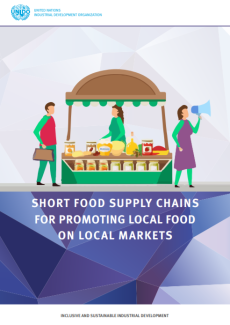Strengthening the resilience of Food Systems: the role of Short Food Supply Chains
The new UNIDO publication titled “Short Food Supply Chains for promoting Local Food on Local Markets” gives an insight over the main typologies of Short Food Supply Chains (SFSC) initiatives, presenting their potential benefits and drawbacks. Broadly speaking, SFCSs aim at reducing the “distance” between agriculture and final consumption, directly re-connecting farmers to consumers, and are at the crossroad of economic, environmental and social issues.
The ultimate goal is to raise consciousness on the potential of SFSCs initiatives for achieving local development, better market access to smallholders, and higher food quality to consumers, and to discuss how SFSCs contribute to diversify food production systems and marketing channels, allowing for higher resilience in front of global market disruption.
According to UNCTAD, low-income countries devote 37% of their merchandise export revenue to food imports, more than five times the share by developed economies. This makes these countries extremely vulnerable to external shocks to food supply chains like the COVID-19 is provoking. Moreover, at the global level, restrictions on movements are hampering small farmers’ access to markets to buy inputs and sell products, and are reducing the availability of the workforce resulting in loss of income and waste of food. To increase resilience in the food supply chains there is therefore an urgent need to rebalance the relationship between long and short food supply chains.
Read the publication here.
For more information, please contact Fabio Russo (F.Russo [at] unido.org (F[dot]Russo[at]unido[dot]org)).

